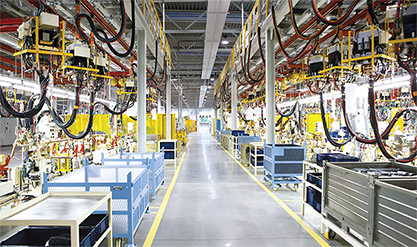Zebra Technologies Corp. yesterday launched a suite of systems to enable track-and-trace capabilities in warehouses and quality inspection in factories. The Lincolnshire, Ill.-based company has also acquired Adaptive Vision Sp. z o.o., which provides machine vision software to developers, systems integrators, and end users.
“We are excited to introduce our first suite of MV [machine vision] and FIS [fixed industrial scanning] solutions for the industrial automation market,” stated Donato Montanari, vice president of machine vision solutions at Zebra Technologies. “These solutions will provide a simple, out-of-box experience and superior reliability that enables maximum visibility and the rapid transformation of image capture into actionable business information.”
Adaptive Vision said its tools and algorithms can help power users create complex machine vision applications while assisting novice customers with producing full-featured applications without coding.
“The addition of Adaptive Vision’s MV software, deep learning expertise and team of machine vision engineers will provide manufacturers greater visibility into the status and condition of their goods and assets through visual-based sensing and analytics capabilities,” said Zebra.
Zebra offers intuitive machine vision and scanning
Zebra Technologies said its systems inspect production lines and product movement processes, helping to improve quality in manufacturing, warehouse, and logistics environments. With more than 10,000 partners across 100 countries, the company said it delivers industry-specific systems to enable every asset and worker to be visible, connected, and fully optimized. Zebra added that its technologies elevate the shopping experience, track and manage inventory, as well as improve supply chain efficiency and patient care.
The company uses the same rugged hardware for its MV smart cameras and fixed industrial scanners. Both use Zebra Aurora, a unified software platform that the company said is easy to set up, deploy, and run. Zebra claimed that its machine vision can help reduce defects as well as validate assembly and tracking information to improve productivity and quality.
“Zebra Aurora is focused on entry-level and midlevel machine vision challenges, while Adaptive Vision is focused on high-end customers,” Montanari told Robotics 24/7. “We expect to keep investing in the different software platforms, with Aurora for end users and channel partners and Adaptive Vision for systems integrators.”
“A lot of the cost is not in the hardware but in the programming, because you have to have an expert come and write the code to describe an object,” he said. “I was in a factory in Germany before COVID-19, and the box to control a camera was locked. Posted was the phone number of the only staffer who knew the software. That's not a scalable approach.”
“We dramatically reduce the cost with deep learning in the cloud and bringing it back to the camera,” said Montanari. “With dual Ethernet ports on the cameras, connected with the PLC [programmable logic controller], we can operate seamlessly in the cloud while also running inspections.”
Zebra’s new portfolio includes seven fixed data-capture products. Businesses can upgrade at any time to add support for new bar-code symbologies, increased scanning speeds, or advanced machine vision tools via the simple purchase of a software license, it said.
The fixed industrial scanners can improve track-and-trace capabilities throughout the supply chain with decoding of every part and package moving through production, storage, and fulfillment, said Zebra. They are capable of reading 1D/2D barcodes, direct part marks (DPM), and optical character recognition (OCR) text.
These new industrial automation products expand on Zebra’s acquisition of Cortexica Vision Systems Ltd. and its SmartPack and SmartSight systems, which use computer vision hardware and software to improve workflows at the operational edge of business.
Adaptive acquisition and PartnerConnect program
Gliwice, Poland-based Adaptive Vision was founded in 2007 and said it is a leading provider of user-friendly machine vision software.
Zebra paid for Adaptive Vision with cash on hand. It said it does not expect the transaction to affect sales and profitability in the near term. Financial terms of the acquisition were not disclosed.
“This is an exciting time to join Zebra and bring our machine vision software to help Zebra’s industrial customers operate more efficiently in increasingly automated, data-powered environments,” said Michał Czardybon, CEO of Adaptive Vision. “Our machine vision software and libraries are designed to allow users to easily build MV and deep-learning applications, so this is a significant strategic enhancement to Zebra’s new solutions.”
“The acquisition of Adaptive Vision accelerates our Enterprise Asset Intelligence vision as we continue to embrace new methods of data capture to meet the expanding and evolving needs of our customers,” said Anders Gustafsson, CEO of Zebra Technologies.
“Adaptive Vision complements our legacy barcode skill set with machine vision specialists,” said Montanari. “We're working on quite a few use cases now with customers, and we have two main themes with our applications. The first is about improving the efficiency of workers by thinking about the industrial readers and camera beside the operator, which pertains to warehouses and e-commerce.”
“Moving into manufacturing, there's the idea of seeing the work in progress—the presence or absence of things on a part such as a circuit board,” he added. “Aurora's software makes it easier for customers and partners to put together applications without requiring a high level of expertise.”
“We're interested in AI techniques rather than rule-based detection,” noted Tom Bianculli, chief technology officer of Zebra. “With cloud learning, we can push that inference engine down to the smart camera, democratizing use cases and improving the level of experise at the end of the line.”
“Manufacturing has a 'zero defect' mentality, and warehousing has 'no read,' where 99% is not very good,” he said. “The terminology, constraints, and throughputs are different, but the need for smart cameras is the same.”
Zebra also introduced a new track in its PartnerConnect program for industrial automation business partners, distributors and systems integrators. These select partners have experience in fixed industrial scanning, machine vision, and automation to help user companies, it said.
About the Author
Follow Robotics 24/7 on Linkedin
Article topics
Email Sign Up


















